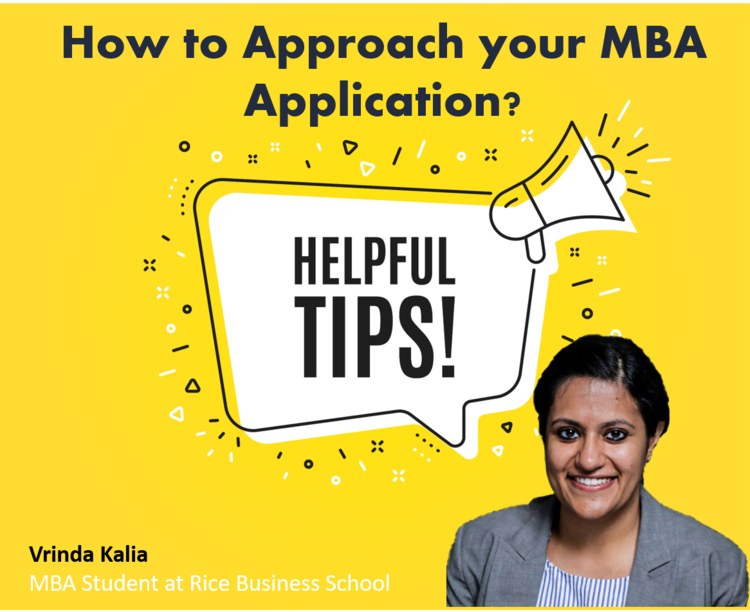The MBA application process for the top business schools is becoming more complex, with various parameters that you will be evaluated on. It is already pointed out by the business school Admissions committee that an applicant is not only judged on their GMAT/GPA score but the overall MBA application.
There are various factors that they take into consideration, such as MBA Essay, Letter of Recommendations, extra-curricular activities, and work experience.
To have a better understanding of how to approach different aspects of your MBA application, we have launched an MBA Journey series, where we have a conversation with MBA candidates from top business schools and understand how they created their MBA application.
We had a chat with Vrinda, a second-year student at Rice Business School, who talks about her MBA Application journey so that you could learn how to approach your MBA Application. She has got an offer from Dell and will be starting in June 2020 as a product line manager.
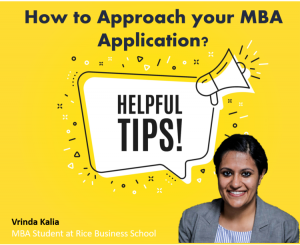
Below is her video interview with Aayush – a first-year student at Columbia Business School, and e-GMAT student who scored 750 on the GMAT.
Did you know a GMAT score of 730+ yields incremental $500K in ROI? Start your GMAT Preparation by Signing up for our FREE Trial and get access to FREE online GMAT preparation resources. We are the most reviewed GMAT preparation company on GMATClub with more than 1870 reviews.
You can also read this article to get an overall picture of her MBA Journey, where she talks about why she decided to pursue an MBA and share tips on writing MBA essay questions, getting letters of recommendation, preparing for the interview, and much more.
The article is based on the Q&A webinar with Vrinda. Click on the link to jump to the relevant section. Here is the outline of the article:
- Motivation for MBA
- Process of Identifying Business schools Fit
- Tips for MBA Essay questions
- Tips on Getting Letter of Recommendations
- Tips on MBA Interview
- Questions asked by Webinar Attendees
Motivation for MBA
Aayush: What motivated you to pursue an MBA?
Vrinda – After completing my Engineering from Manipal University, I joined Deloitte consultancy as a Tech consultant. I worked out of the Bangalore office for three years, after which I took a project in LA. I was six years in with Deloitte and really enjoyed my work. It was at this point when I started reflecting on my journey and why I started working in the first place.
I was a Tech consultant doing implementation work. I wanted to have a career transition upwards and be a part of decision making. I wanted to understand what and why to implement a specific strategy rather than just doing the groundwork. To make this career transition, I realized that I require a set of skills that an MBA degree can offer and help me pivot to the management direction.
Learn more about the benefits of pursuing an MBA.
Identifying Business School Fit
Aayush: What factors did you take into consideration while Identifying the Business Schools you applied to?
Vrinda – Usually, to identify the business school, many MBA aspirants follow the process where they look for the top business schools and then start tailoring themselves to apply to those b-schools. But for me, it was different.
I think the research part should be the essential factor while identifying your business school. I started talking to people and friends who have made this transition of going to a business school and tried to understand things that make a business school great for me.
Here is the process that I followed:
- Identifying and talking to people who have faced the same situation
- Listing down the parameters that you want in a Business school. (For example, I wanted a small class size and affordable cost of living)
- Identifying which business school fits your parameters
- Dividing the list of business schools based on the GMAT score
- Attending information sessions and MBA seminars of the shortlisted Business Schools
- Identifying your top five business schools
The key is not to just get into the best business school, but a school that fits your criteria. You need to be picky and not go after any school that lets you in. Also, I highly recommend going to Business schools’ seminars and events that are conducted worldwide and meet the admissions team to have more insight into which business school is the Best Fit for you.
Here is an article on how to choose a business school that is the Right Fit for you.
Aayush: You got an admit from Rice and ISB, which are two different schools in terms of geography. How did you decide between the two?
Vrinda – Three major points made me choose Rice Business School over ISB:
- Gaining Scholarship from Rice University
- Experiencing the US study system
- Smaller Class size
Aayush: Did you hire an MBA consultant for the process?
Vrinda – No, I did not hire any MBA consultant for the process. In my case, I had done a lot of groundwork and research on business schools. Also, a lot of my closest friends had already been through the MBA admissions process, so I got insights from them. Thus, with a credible pool of resources and a great support system, I didn’t feel the need to hire an MBA consultant.
Hiring an MBA consultant is a personal choice, and I do think that they bring a lot of value. But in my case, due to a reliable support system, I preferred not to hire an MBA consultant.
Tips for MBA Essay questions
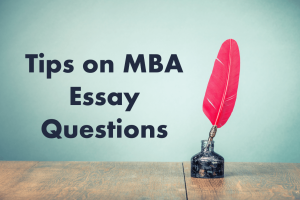
Aayush: How did you craft your short-term and long-term goals? What does Adcoms look for while evaluating your MBA essays?
Vrinda – The admissions committee looks for the coherence of thought while evaluating your MBA essay. They want to know that you make logical decisions and are not doing an MBA on a whim. Thus, while crafting your essay, you need to make sure that it has a logical sequence and is realistic.
For short-term goals, your story should relate to your past experiences and how did you decide to make a transition or a career change based on those experiences. For the long-term goals, you should tie it to your past experiences, what you want to achieve with an MBA and your short-term goals. It should be presented as a journey. Making these connect helps Adcoms to understand your goals in a logical way. Thus, there should be a logical flow in your story.
Aayush: How to go about writing the MBA essay, where you need to highlight your leadership stories?
Vrinda – Firstly, you must keep in mind that you can’t fabricate your leadership story. Adcoms can see right through it. You need to come up with a story based on your past experiences, and once you have identified a set of stories, the next step is to check what principals your targeted business school cares about. Each b-school has a set of personalities, and your story should portray those principals.
For example, if the business school is known for its close net community, presenting a story where you were involved in teamwork will resonate more with the school’s principals.
Here is an article on diffrent types of MBA essays explained with examples.
Tips on Getting Letter of Recommendations
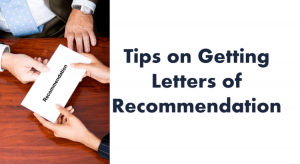
Aayush: How did you go about identifying people for your Letter of recommendation?
Vrinda – I had worked only at one firm, and thus my pool of recommendation was a little small. But I was lucky as my manager knew that I was looking into Business schools and that support was always there.
To identify from whom to get recommendations, you need to identify a person who has worked and supervised you firstly. They will be in a better position to judge you and know your strengths. Also, they should be able to articulate your strengths and weakness clear.
You need to make sure that they are on the same page as you by having an open discussion. They should be able to communicate the strengths that you want to portray in your application and discuss the same.
Also, your recommenders should not be portraying completely different types of strength as compared to what you have incorporated in your MBA essay.
You should have a role in at least reading your LOR, if not influencing it and judging if you want to keep that LOR or move on to another one.
Tips on MBA Interview
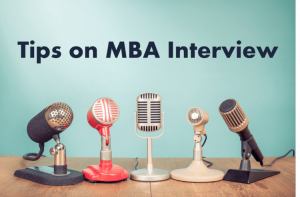
Aayush: How was your Overall interview experience between Rice and ISB? How did you practice for it?
Vrinda – Both the interviews with ISB and Rice were virtual.
For ISB, the interviewees were past students, whereas, for Rice, the interviewees were current students.
The overall interview experience for me was excellent. It was very conversational, and there were straight forward questions. One piece of advice that I can give is to have a variety of stories that you can rely on in your interview. For example, what if they ask you a failure story and a success story.
Thus, you should make sure you have back up stories while preparing for your interview.
Read this article for the Most common MBA interview questions.
What do Interviewees look for?
They see if you will be a good fit in the classroom. Thus you have to come across as a good person and not a highly competitive one unless you are targeting the business school that values competition.
Quick Tips on MBA Interview
- Seek constant feedback on your stories.
- Practices but not over-rehearse
- Give mock interview
- Be casual and not nervous
- Don’t look at notes while having virtual interviews.
Questions asked by Other webinar Attendees
Question 1: Does working in a mid to small size company affect our chances to get into the top business schools?
Vrinda – This is just an assumption that many people have. Business schools look for a diverse pool of candidates. They want people from different walks of life, and if you can showcase the initiatives you took or leadership qualities you have, working for a mid to small company will not affect your chances of getting an admit.
Question 2: Does a low academic score affect your MBA Application?
Vrinda – I don’t think that your academic scores make or break your MBA Application. You should focus on other aspects of your application, such as your work experience and highlight instances where you have shown leadership skills.
Question 3: Do extra certification matters, such as CFA and CPA?
Vrinda – Yes, it does help. Certifications demonstrate specialization and expertise. Thus, I do think additional certification adds value to your MBA application.
Question 4: What is the impact of the COVID-19 outbreak on R1 admissions in 2020 and job prospects?
Vrinda – When it comes to job prospects, if students start their MBA in 2020, we all hope that things will be better once they graduate in 2022. But the students who are graduating right now are a little bit worried because companies are pushing out their recruitment process to later dates.
In my opinion, job prospects would be fine and not get hampered severely.
For MBA admissions, I think business schools will try and find their way around it, like offering online classes. Read here how business schools are tackling the situation of the COVID-19 outbreak.
Read our article on the impact of Coronavirus pandemic on business school students and aspirants.
Question 5: Does changing your industry before MBA affect your application?
Vrinda – Changing your industry is fine if you can explain why you did it. MBA Applications have an optional essay that you can utilize to clarify why you did it and how it fits in your future. Thus, switching industry does not affect your application, if you can justify it.
Question 6: How to identify schools with Scholarships?
Vrinda – To identify schools with scholarships, the best way is to talk to people. Talk to students and research a bit to find out which school is more liberal while offering scholarships.
Question7: How many years of work experience do you need?
Vrinda – we keep hearing that a minimum of 3 years of work experience is required, but I do have classmates who joined the MBA just out of grad school. However, they did have a good profile, such as one of them started his own company and the other one got training for the Olympics. So there is no hard and fast rule on the years of experiences.
Question 8: What parameters can be considered for a 1-year v/s 2 years course?
Vrinda – If your goal is to change industries, a 2-year MBA is a safer bet as it offers you internship opportunities.
Question 9: How Ad Coms look at Extra-Curricular and how to develop this?
Vrinda – Extracurricular activities help showcase that you have an interest other than your work or curriculum. It sets you apart and shows that you have a rounded personality. Thus, extra-curricular activities add value to your application.


